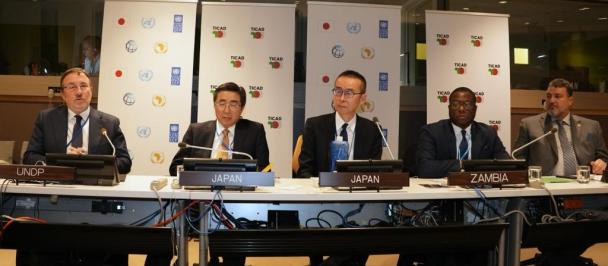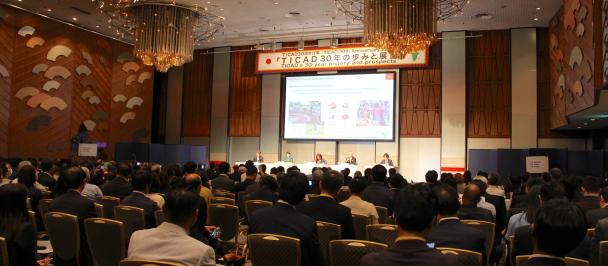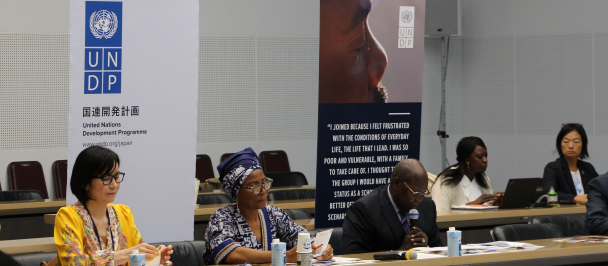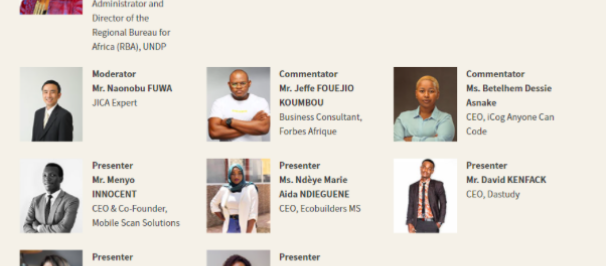As several countries across Africa continue to be impacted by third and fourth waves of the COVID-19 pandemic, the latest AFRI CONVERSE 2021 dialogue took a closer look at innovative local initiatives and the ongoing international support to bolster the continent’s response to the virus.
Approximately 18 months since the outbreak of the pandemic, over 2.5 million people in Africa have been infected and the death toll is in the tens of thousands. A recent United Nations Development Programme (UNDP) study warned that by 2030, approximately eight out of 10 people pushed into poverty due to COVID-19 will live in countries on the lower end of human development, with the heaviest burden falling on Africa.
And yet, in spite of the harsh impact of the pandemic on livelihoods, the continent has demonstrated extraordinary resilience across various sectors when compared to the other regions of the world.
Opening the fourth instalment of the AFRI CONVERSE dialogue this year, Professor Tomohiko Sugishita, from the Department of International Affairs and Tropical Medicine at the Tokyo Women’s Medical University said, “this session is a wakeup call for us to examine Africa’s ingenuity, productivity and capacity to mitigate the pandemic, as well as determine how we can support such opportunities in building a new future for the continent.”
“To boost the efforts taken by our partner countries in Africa and other parts of the world in response to the pandemic, JICA has launched JICA’s Initiative for Global Health and Medicine focusing on treatment, precaution, and prevention. We are cooperating through the existing technical cooperation projects, not only in health but in other sectors like education, water and sanitation, agriculture, nutrition, as well as other social services,” said Mr. Ikuo Takizawa, the Senior Director in the Office for COVID-19 Response, Human Development Department at JICA.
Between April 2020 and May 2021, he noted that, on top of the cooperation through the existing technical cooperation projects, JICA approved grant aid for public hospitals and national health institutions in several countries in Africa, as well as for water supply facilities, and nutrition and food production. Loan assistance to promote Universal Health Coverage (UHC) and COVID-19 response based on the concept of human security was approved for some countries as well. Looking at the post COVID-19, he added the need for further strengthening the network of African public health institutions, promotion of applied biomedical R&D in Africa involving private sector partners, and global collaboration to backup such efforts, together with accelerated actions to deliver the past commitment toward “UHC with resilience”.
Referring to the regional impact assessments recently conducted, UNDP’s Regional Programme Coordinator for Africa, Mr. Jide Okeke, warned while there are innovative local initiatives underway to curb the spread of the virus across the continent, the impact of the pandemic on Africa’s overall human development progress was particularly concerning from the lenses of peace, security and governance as well as social, economic and political aspects.
He underscored the importance of greater regional coordination and cooperation as well as supporting capacity-building. In this regard, he stressed the need to support SMEs which account for 90% of all businesses on the continent and 85.8% of all jobs in the informal sector. He also demonstrated UNDP’s partnership with AfriLabs which delivered intensive boot-camp training to 360 entrepreneurs from 120 small businesses, providing them with more than 1,500 hours in a high-tech business simulator and boosting their decision-making skills under various market conditions.
Co-founder of Afrochampions Dr. Edem Adzogenu said Afrochampions in collaboration with UNDP have set the bar for ‘homegrown’ partnerships that can transform the continent, especially with regards to tracking COVID-19 vaccinations as a means of restoring cross-border trade and travel. “Africa is currently embarking on the biggest adult vaccination programme in its history. But the records system is paper-based, manual, fragmented and cannot support planning and decision-making,” noted Mr. Adzogenu.
To address the challenge, UNDP, Afrochampions and the PanaBIOS Consortium launched Global Haven, a pan-African AI solution that offers standardized and harmonized testing platform and digitizes the delivery mechanisms of vaccines to boost efficiency, equity and trust, thereby ensuring vaccine equality and its verification beyond borders.
According to Dr. Bernice McLean, AUDA-NEPAD Acting Head of the Industrialization Division, local solutions emerging from Africa have the potential to make the continent more resilient, but many currently face challenges. “Our goal is to accelerate local solutions to strengthen Africa's pandemic resilience, in line with the African Union's Agenda 2063 aspirations and to provide tailored acceleration planning and support for companies that can meaningfully improve resilience across the continent,” she explained.
Through its flagship “Home Grown Solutions Accelerator Initiative” (HGS), AUDA-NEPAD, in collaboration with JICA with support of the Boston Consulting Group, is working to strengthen Africa’s micro, small and medium enterprises for increased pandemic resilience in the health sector. The HGS initiative is designed to respond to the expressed needs of the selected companies through tailored acceleration support across four areas, including context-specific advisory, introduction of potential funders, regulatory and trade facilitation, and matching with the strategic partners. Lessons from the current “learn by doing” phase of the HGS initiative, which is being implemented in East Africa, will inform subsequent scaling up phases of the initiative in other areas of the continent.
AFRI CONVERSE will continue to be held bi-monthly and build momentum for the Tokyo International Conference on African Development (TICAD) 8 in 2022 by mobilising a diverse range of stakeholders from Africa and Japan to galvanize discussions on the best solutions for the continent.

 Locations
Locations



